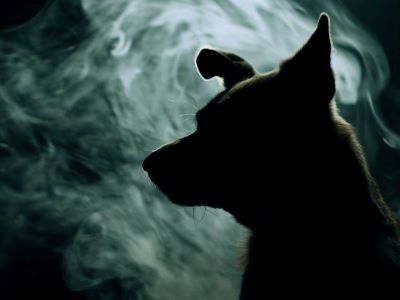
Nicotine poisoning in dogs is a grave concern for pet owners, as this toxic condition can have severe consequences on their beloved companions.
Understanding the sources and symptoms of nicotine exposure, as well as the diagnosis, treatment, prevention, and prognosis of this poisoning, is crucial in ensuring the well-being of our canine friends.
Let’s explore the various aspects of nicotine poisoning in dogs to gain a comprehensive understanding of this veterinary emergency.
Contents
What Is Nicotine Poisoning in Dogs?
When canines consume anything containing nicotine, such as tobacco, cigarettes, nicotine gum, or patches, they might develop a disease known as nicotine poisoning.

Especially in high amounts or in tiny animals, nicotine, a naturally occurring chemical stimulant, can be hazardous to dogs’ neurological systems.[1]
Sources and Symptoms of Nicotine Poisoning in Dogs
Dogs can be exposed to nicotine in various ways, such as:
- Inhaling secondhand smoke from cigarettes or other tobacco products.
- Chewing on tobacco, cigar butts, nicotine gum or patches.
- Swallowing e-cigarettes, liquid nicotine or nicotine capsules.
The symptoms of nicotine poisoning in dogs can develop quickly, usually within 30 to 60 minutes of ingestion, but sometimes they can be delayed by several hours. The symptoms depend on the amount and type of nicotine ingested, relative to the dog’s body weight. Some common symptoms include:
- Hyperactivity
- Drooling
- Constricted pupils
- Stumbling
- Vomiting or diarrhea
- Labored breathing
- Twitching
- Elevated heart rate
- Seizures
Nicotine poisoning can be fatal if not treated promptly, so it is important to contact a veterinarian immediately if you notice any of these signs in your dog.
Diagnosis and Treatment of Nicotine Poisoning in Dogs
a). Diagnosis of nicotine poisoning in dogs: The diagnosis of nicotine poisoning in dogs is based on the history of exposure, the clinical signs and the results of blood tests.

If you did not see your dog ingest the nicotine, but you or a family member have nicotine products, be sure to let the veterinarian know so he can do a quick blood and urine chemical test to determine if that is the problem.
The sooner the diagnosis is made, the better, because prompt treatment is essential to your dog’s recovery.
b). Treatment of nicotine poisoning in dogs: The treatment of nicotine poisoning in dogs typically involves giving the dog fluids and other supportive care to help them through the symptoms.
In severe cases, dogs may need to be hospitalized and receive more intensive treatment. If exposure is noted promptly, within an hour, the usual treatment is decontamination.
If your dog is not vomiting, you can induce vomiting by administering 1 glass of water that contains 1 tbsp of hydroxide peroxide.
When vomiting, the dog will eliminate a large part of the ingested substances and this can diminish the amount of nicotine that will be absorbed in the system.
The veterinarian may also give your dog activated charcoal to bind the remaining nicotine and prevent further absorption.
Other medications may be given to lower heart rate, reduce blood pressure and stop tremors and seizures.
Complications and Recovery of Nicotine Poisoning in Dogs
Nicotine poisoning can cause serious complications in dogs, such as:
- Cardiac arrhythmias (irregular heartbeats)
- Respiratory failure
- Muscle paralysis
- Brain damage
- Death
The prognosis for dogs with nicotine poisoning is generally good if they receive prompt veterinary care. However, some dogs may have long-term effects from the damage to their nervous system or heart.
It is important to follow up with your veterinarian and monitor your dog’s condition closely after a nicotine poisoning episode.
You may need to restrict your dog’s activity, give them medications or supplements, or change their diet according to your veterinarian’s recommendations.
The best way to prevent nicotine poisoning in dogs is to keep all nicotine products out of their reach and dispose of them properly.
Do not smoke around your dog or leave cigarette butts or ashtrays where they can access them. Store nicotine gum, patches, e-cigarettes, liquid nicotine or capsules in a secure place that your dog cannot open or chew.
If you suspect that your dog has ingested any nicotine product, call your veterinarian or an animal poison control center immediately.
Nicotine Toxicity and Overdose in Dogs

When canines consume items containing nicotine, such as cigarettes, chewing tobacco, nicotine patches, e-cigarettes, and liquid nicotine, they may experience nicotine toxicity and overdose, which is a dangerous and potentially lethal disease.
Nicotine is a poison that acts quickly and can overstimulate the nervous system, resulting in symptoms including vomiting, diarrhea, drooling, agitation, weakness, tremors, seizures, and cardiac arrest.
According on the dog’s weight and the amount of nicotine included in the product, the amount of nicotine that might be harmful varies.
With a median lethal dosage of 9.2 mg/kg, tiny dogs can die from exposure to as little as one cigarette or a teaspoon of liquid nicotine.[2]
Risk Factors and Prevention of Nicotine Toxicity and Overdose in Dogs
Some factors that increase the risk of nicotine toxicity and overdose in dogs include:
- The size and weight of the dog: smaller dogs are more susceptible to nicotine poisoning than larger dogs.
- The type and amount of nicotine product: some products have higher concentrations of nicotine than others, such as liquid nicotine or nicotine gum.
- The presence of other toxins: some products may contain other harmful substances, such as xylitol, a sweetener that is toxic to dogs.
- The duration and frequency of exposure: repeated or prolonged exposure to nicotine can increase the severity of symptoms and complications.
Nicotine Poisoning in Dogs: A Veterinary Emergency
Dog nicotine poisoning is a medical emergency that has to be treated right away.
Nicotine is a poison that acts quickly and can induce overstimulation of the nervous system, which can result in symptoms including vomiting, diarrhea, drooling, agitation, weakness, tremors, seizures, and cardiac arrest.

The weight of the dog and the amount of nicotine present in the product both affect the amount of nicotine that can be toxic.
A tiny dog can die from less than a teaspoon of liquid nicotine or one cigarette due to the median lethal dosage in dogs being 9.2 mg/kg.
The Toxic Effects of Nicotine on Dogs’ Nervous System
Both canines and humans are affected by the natural chemical stimulant nicotine’s effects on the neurological system.
Nicotinic acetylcholine receptors (nAChRs), which are found in the brain, spinal cord, muscles, and other organs, are the receptors that nicotine binds to.
Neurotransmitters including dopamine, serotonin, and norepinephrine are released more often as a result of nicotine binding to these receptors.
These neurotransmitters control a variety of processes, including pain, hunger, and mood.
However, when dogs are exposed to high doses of nicotine, it can cause an excessive stimulation of these receptors and lead to toxicity.
Nicotine toxicity can affect various parts of the nervous system, such as:
- The central nervous system (CNS): this includes the brain and spinal cord. Nicotine toxicity can cause symptoms such as hyperactivity, twitching, hyperesthesia (increased sensitivity to light, sound, touch), tremors, hallucinations and seizures.
- The peripheral nervous system (PNS): this includes the nerves that connect the CNS to the rest of the body. Nicotine toxicity can cause symptoms such as drooling, vomiting, diarrhea, weakness, muscle paralysis and respiratory failure.
- The autonomic nervous system (ANS): this includes the nerves that control involuntary functions such as heart rate, blood pressure, digestion and temperature. Nicotine toxicity can cause symptoms such as constricted pupils, elevated heart rate, high blood pressure and cardiac arrhythmias (irregular heartbeats).
How to Treat Nicotine Poisoning in Dogs at Home
If you suspect that your dog has ingested any nicotine product, you should take the following actions to treat your dog at home:

- Call your veterinarian or an animal poison control center immediately and follow their instructions.
- Do not induce vomiting unless advised by a veterinarian or a poison control center.
- Do not give your dog any antacids or other medications without consulting a veterinarian.
- Keep your dog calm and comfortable until you reach the veterinary clinic.
The treatment of nicotine poisoning in dogs typically involves giving the dog fluids and other supportive care to help them through the symptoms. In severe cases, dogs may need to be hospitalized and receive more intensive treatment.[3]
The veterinarian may also give your dog activated charcoal to bind the remaining nicotine and prevent further absorption. Other medications may be given to lower heart rate, reduce blood pressure and stop tremors and seizures.
FAQs
What are signs of nicotine poisoning in dogs?
Signs of nicotine poisoning in dogs include restlessness, vomiting, diarrhea, tremors, and seizures. Veterinary help should be sought immediately.
Can a dog survive nicotine poisoning?
The survival of a dog with nicotine poisoning depends on factors like the amount ingested, size of the dog, and prompt veterinary care.
How long does it take for nicotine poisoning to affect a dog?
Symptoms of nicotine poisoning in dogs can manifest between 15 minutes to a few hours after ingestion, depending on various factors such as the form of nicotine (cigarettes, nicotine gum, etc.) and the dog’s metabolism.
What are four signs of nicotine poisoning?
Vomiting, diarrhea, tremors, and an increased heart rate are four common signs of nicotine poisoning in dogs, although other symptoms may also be present.
Conclusion
Nicotine poisoning in dogs poses a significant threat to their health and requires immediate attention.
By recognizing the sources and symptoms of nicotine exposure, promptly diagnosing and treating the condition, implementing preventive measures, and understanding the factors that influence severity, we can safeguard our furry friends from the dangers of nicotine toxicity.
Remember, being well-informed and proactive is vital in protecting our dogs and providing them with a safe and healthy environment.
References:
- Nicotine poisoning in a dog. (1990, December 1). PubMed. Retrieved July 13, 2023, from – NCBI
- Novotny, T. E., Hardin, S. M., Hovda, L. R., Novotny, D. J., McLean, M. A., & Khan, S. N. (2011). Tobacco and cigarette butt consumption in humans and animals. Tobacco Control, 20(Supplement 1), i17–i20. – BMJ Journals
- Pet Poison Helpline. (2020, March 3). Nicotine Is Toxic To Dogs | Pet Poison Helpline. Retrieved July 13, 2023, from – PET POISON HELPLINE

Julia is a Board Certified Veterinary Nutritionist, practicing veterinarian in a non-profit animal hospital and feline sanctuary located in Rochester, NY. She is also a full-time veterinary advisor at DogLikesBest. She focuses on writing healthcare-related topics including dog foods, treats, veterinary diets, food for specific healthcare features, etc. Moreover, any article on DogNeedsBest that has to concern feline health in any way, goes under her scrutiny before being published.

